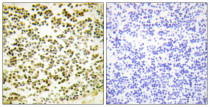ARG66790
anti-RBL1 / p107 phospho (Thr369) antibody
anti-RBL1 / p107 phospho (Thr369) antibody for ELISA,IHC-Formalin-fixed paraffin-embedded sections,Western blot and Human
Overview
| Product Description | Rabbit Polyclonal antibody recognizes RBL1 / p107 phospho (Thr369) |
|---|---|
| Tested Reactivity | Hu |
| Tested Application | ELISA, IHC-P, WB |
| Host | Rabbit |
| Clonality | Polyclonal |
| Isotype | IgG |
| Target Name | RBL1 / p107 |
| Antigen Species | Human |
| Immunogen | Phosphospecific peptide around Thr369 (aa. 335-384) of Human RBL1 / p107. |
| Conjugation | Un-conjugated |
| Alternate Names | CP107; p107; 107 kDa retinoblastoma-associated protein; Retinoblastoma-like protein 1; pRb1; PRB1 |
Application Instructions
| Application Suggestion |
|
||||||||
|---|---|---|---|---|---|---|---|---|---|
| Application Note | * The dilutions indicate recommended starting dilutions and the optimal dilutions or concentrations should be determined by the scientist. |
Properties
| Form | Liquid |
|---|---|
| Purification | Affinity purification with immunogen. |
| Buffer | PBS, 0.02% Sodium azide, 50% Glycerol and 0.5% BSA. |
| Preservative | 0.02% Sodium azide |
| Stabilizer | 50% Glycerol and 0.5% BSA |
| Concentration | 1 mg/ml |
| Storage Instruction | For continuous use, store undiluted antibody at 2-8°C for up to a week. For long-term storage, aliquot and store at -20°C. Storage in frost free freezers is not recommended. Avoid repeated freeze/thaw cycles. Suggest spin the vial prior to opening. The antibody solution should be gently mixed before use. |
| Note | For laboratory research only, not for drug, diagnostic or other use. |
Bioinformation
| Database Links | |
|---|---|
| Gene Symbol | RBL1 |
| Gene Full Name | retinoblastoma-like 1 |
| Background | The protein encoded by this gene is similar in sequence and possibly function to the product of the retinoblastoma 1 (RB1) gene. The RB1 gene product is a tumor suppressor protein that appears to be involved in cell cycle regulation, as it is phosphorylated in the S to M phase transition and is dephosphorylated in the G1 phase of the cell cycle. Both the RB1 protein and the product of this gene can form a complex with adenovirus E1A protein and SV40 large T-antigen, with the SV40 large T-antigen binding only to the unphosphorylated form of each protein. In addition, both proteins can inhibit the transcription of cell cycle genes containing E2F binding sites in their promoters. Due to the sequence and biochemical similarities with the RB1 protein, it is thought that the protein encoded by this gene may also be a tumor suppressor. Two transcript variants encoding different isoforms have been found for this gene. [provided by RefSeq, Jul 2008] |
| Function | Key regulator of entry into cell division (PubMed:17671431). Directly involved in heterochromatin formation by maintaining overall chromatin structure and, in particular, that of constitutive heterochromatin by stabilizing histone methylation (By similarity). Recruits and targets histone methyltransferases KMT5B and KMT5C, leading to epigenetic transcriptional repression (By similarity). Controls histone H4 'Lys-20' trimethylation (By similarity). Probably acts as a transcription repressor by recruiting chromatin-modifying enzymes to promoters (By similarity). Potent inhibitor of E2F-mediated trans-activation (PubMed:8319904). May act as a tumor suppressor (PubMed:8319904). [UniProt] |
| Cellular Localization | Nucleus. [UniProt] |
| Calculated MW | 121 kDa |
| PTM | Exists in both phosphorylated and unphosphorylated forms, and T, but not E1A, binds only to the unphosphorylated form. Cell-cycle arrest properties are inactivated by phosphorylation on Thr-332, Ser-640, Ser-964 and Ser-975 by CDK4. [UniProt] |
Images (1) Click the Picture to Zoom In






